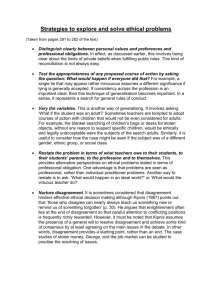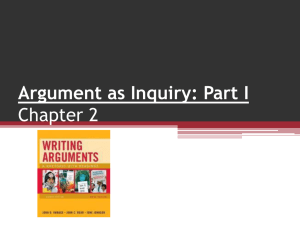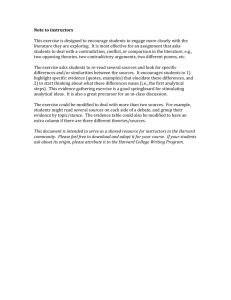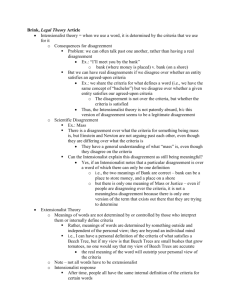verb speakers
advertisement
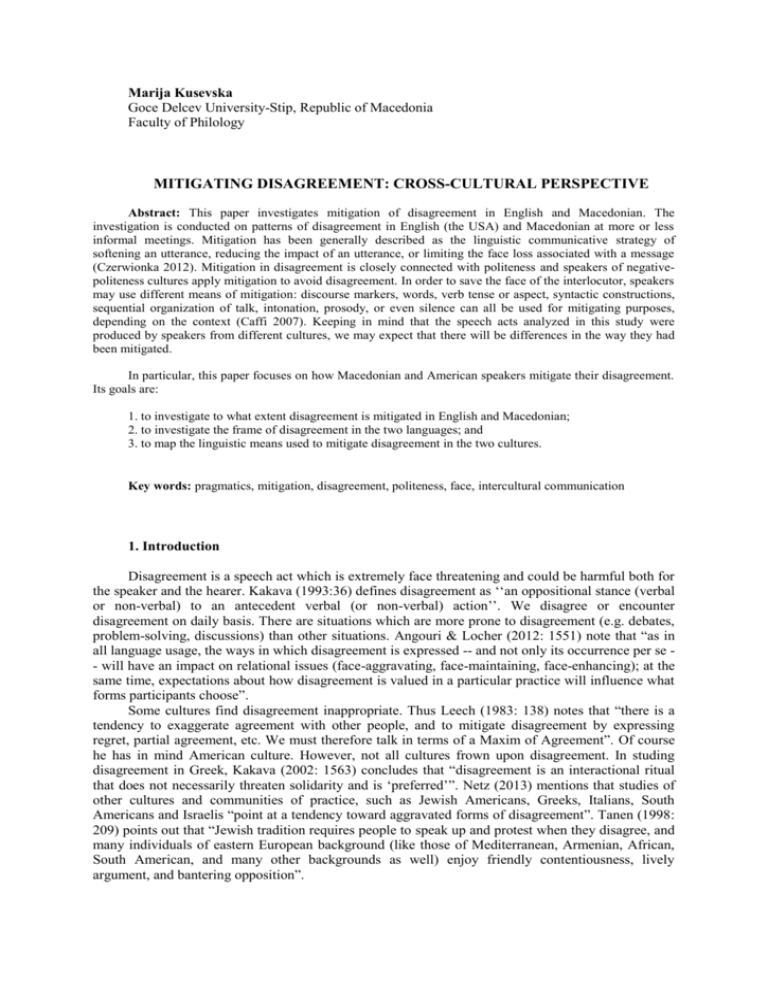
Marija Kusevska Goce Delcev University-Stip, Republic of Macedonia Faculty of Philology MITIGATING DISAGREEMENT: CROSS-CULTURAL PERSPECTIVE Abstract: This paper investigates mitigation of disagreement in English and Macedonian. The investigation is conducted on patterns of disagreement in English (the USA) and Macedonian at more or less informal meetings. Mitigation has been generally described as the linguistic communicative strategy of softening an utterance, reducing the impact of an utterance, or limiting the face loss associated with a message (Czerwionka 2012). Mitigation in disagreement is closely connected with politeness and speakers of negativepoliteness cultures apply mitigation to avoid disagreement. In order to save the face of the interlocutor, speakers may use different means of mitigation: discourse markers, words, verb tense or aspect, syntactic constructions, sequential organization of talk, intonation, prosody, or even silence can all be used for mitigating purposes, depending on the context (Caffi 2007). Keeping in mind that the speech acts analyzed in this study were produced by speakers from different cultures, we may expect that there will be differences in the way they had been mitigated. In particular, this paper focuses on how Macedonian and American speakers mitigate their disagreement. Its goals are: 1. to investigate to what extent disagreement is mitigated in English and Macedonian; 2. to investigate the frame of disagreement in the two languages; and 3. to map the linguistic means used to mitigate disagreement in the two cultures. Key words: pragmatics, mitigation, disagreement, politeness, face, intercultural communication 1. Introduction Disagreement is a speech act which is extremely face threatening and could be harmful both for the speaker and the hearer. Kakava (1993:36) defines disagreement as ‘‘an oppositional stance (verbal or non-verbal) to an antecedent verbal (or non-verbal) action’’. We disagree or encounter disagreement on daily basis. There are situations which are more prone to disagreement (e.g. debates, problem-solving, discussions) than other situations. Angouri & Locher (2012: 1551) note that “as in all language usage, the ways in which disagreement is expressed -- and not only its occurrence per se - will have an impact on relational issues (face-aggravating, face-maintaining, face-enhancing); at the same time, expectations about how disagreement is valued in a particular practice will influence what forms participants choose”. Some cultures find disagreement inappropriate. Thus Leech (1983: 138) notes that “there is a tendency to exaggerate agreement with other people, and to mitigate disagreement by expressing regret, partial agreement, etc. We must therefore talk in terms of a Maxim of Agreement”. Of course he has in mind American culture. However, not all cultures frown upon disagreement. In studing disagreement in Greek, Kakava (2002: 1563) concludes that “disagreement is an interactional ritual that does not necessarily threaten solidarity and is ‘preferred’”. Netz (2013) mentions that studies of other cultures and communities of practice, such as Jewish Americans, Greeks, Italians, South Americans and Israelis “point at a tendency toward aggravated forms of disagreement”. Tanen (1998: 209) points out that “Jewish tradition requires people to speak up and protest when they disagree, and many individuals of eastern European background (like those of Mediterranean, Armenian, African, South American, and many other backgrounds as well) enjoy friendly contentiousness, lively argument, and bantering opposition”. 1.1. Data The paper presented here is a follow-up of a much broder study in the field of cross-cultural pragmatics focusing on disagreement in Macedonian and American English (Kusevska 2012). Our primary research was based on 550 speech acts of disagreement extracted from MRDA1 meetings (American corpus) and 512 speech acts of disagreement taken from Macedonian meetings (Macedonian corpus). The participants of the meetings were of the same profession and there wasn’t a significant distinction in age, power and status. As a result, these variables had no significan’t importance and were not taken into consideration. Our cross-cultural analysis revealed that Macedonian and American native speakers show preferance for different types of disagreement, the major difference being the frequency of use and the distribution of the mitigation devices in the speech acts of disagreement. 1.2. Mitigation Mitigation is an interesting pragmatic concept which shapes the landscape of utterances. In this article we depart from Fraser’s definition that “[m]itigation is defined not as a particular type of a speech act but as the modification of a speech act: the reduction of certain unwelcome effects which a speech act has on the hearer” (Fraser 1980: 341). Similarly, Martinovski (2006: 2066) states that “[i]t is assumed that vulnerability, which may be existential and/or associated with a certain activity or situation, is what causes the phenomenon of mitigation. That is why mitigation is described here as a complex cognitive, emotional, pragmatic, and discursive process whose main function is reduction of vulnerability.” Holmes (1984: 346), building on Fraser, states that “mitigation is a strategy used to reduce the anticipated negative effect of a speech act”. Mitigation thus involves softening or reducing the force of speech acts. It is related to politeness, indirectness, fuzziness, vagueness, reduced commitment, etc. As such, it is specifically addressed by Brown & Levinson ([1978] 1987) in their Theory of politeness. In describing the strategies for doing face-threatening acts (FTA), Brown & Levinson (1987: 68) state that “in the context of mutual vulnerability of face, any rational agent will seek to avoid these face-threatening acts, or will employ certain strategies to minimize the threat”. Accordingly, speakers can realize their speech acts directly (on record) or indirectly (off record). Strategies for on record speech act realization fall in two categories: 1. baldly, without redressive action, which “involves doing it in the most direct, clear, unambiguous and concise way possible” (Brown & Levinson 1987: 69); and 2. with redressive action, which means use of strategies which would give face to the addressee, i.e. attempt to “counteract the potential face damage of the FTA by doing it in such a way, or with such modifications or additions, that indicate clearly that no such face threat is intended or desired”. Languages have developed a variety of linguistic strategies to mitigate the illocutionary force of the speech act, such as claiming common ground, avoiding disagreement, partial agreement, conventional indirectness, mitigation, showing deference, impersonalization, etc. These strategies are realized by the use of specific linguistic devices, such as personal pronouns, questions, if-clauses, downgraders, minimisers, discourse markers, hedges, etc. In our classification of the speech acts of disagreement we followed Brown and Levinson’s theory of politeness (Brown & Levinson, [1978] 1987). In this papr we focus on the direct, on record, speech acts because the percentage of indirect, off record, speech acts was very low in our data. The direct speech acts were classified as direct disagreement with redressive action (mitigated disagreement), and direct disagreement without redressive action and without aggrevation. However, not all speech acts fall in these two categories. Therefore, some were further classified as strong disagreement. We classified as strong disagreement turns which were not prefaced with hedges, concessions, partial agreement, hesitations or any other devices that can make them sound less 1 MRDA (Meeting Recorder Disagreement Speech Acts) is a corpus of 75 meetings recorded at Berkley University. Each of the meetings last about an hour. The issues discussed during the meetings are related participants’ professional interests and their work. threatening. However, we do not consider strong disagreement as rude or impolite and it is not aimed at threatening the face of the interlocutor. In particular, this paper focuses on how Macedonian and American speakers mitigate their disagreement. Its goals are: 1. to investigate to what extent disagreement is mitigated in English and Macedonian; 2. to investigate the frame of disagreement in the two languages; and 3. to map the linguistic means used to mitigate disagreement in the two cultures. 2. Mitigating disagreement in English. Our analysis of disagreement in American English and Macedonian showed that native speakers of the two languages view disagreement differently and show preference for different types of disagreement. What is significant is the difference in the use of direct speech acts with redressive action, i.e. mitigated disagreement, and direct speech acts with aggravation, i.e. strong disagreement. The results in Table 1 demonstrate that Macedonian speakers show preference for strong disagreement, while American speakers show preference for mitigated disagreement. Mitigated disagreement 264 48% English Strong disagreement 151 27,4% Macedonian Mitigated Strong disagreement disagreement 105 240 20.5% 46,9% Table 1 Types of disagreement in English and Macedonian This preference for different types of disagreement brings about application of different strategies and different linguistic means. Examples (1) and (2) show some of the strategies and linguistic means that English has developed to enable speakers to soften their utterances. (1) A: Okay. So, so, I mean that seems, that seems g- - great for all of the encoding of things with time. and … B: oh well. A: um = = i guess my question is more uh what d- - what do you do with say a forced alignment? (2) A: I - I am imagining you'd have multiple versions of this depending on the information that you want. C: Right. A: Um = =, 'm just = = what 'm wondering is whether = =, I think for word level this would be okay. C: yeah. A: for word level it's all right. C: definitely B: uhhuh A: for lower than word level you're talking about so much data that i just - i don't know. C: i mean we actually have A: if that yeah i mean | for something like that i would use p. file. or - or any frame level stuff i would use p. file In example (1), we have a situation in which speaker A does not fully agree with what was said before this turn and s/he believes that what has been proposed cannot be easily applied to all situations. In the speech event we can notice the following strategies: partial agreement prefaced with okay + full turn. In addition to the discourse marker okay, we can notice the use of the mental verb mean, which conveys the meaning that what the speaker is going to say will be just expression of his/her opinion; the use of the stative copula seem which also conveys the meaning that what follows is only the speakers opinion (it seems to me); and great which positively intensifies the speaker’s disagreement. The whole turn suggests some kind of doubt lingering in speaker’s head; this is followed by a supportive move by B; With the next move, A launches his/her disagreement with a question, suggesting that there are cases which the proposed methodology cannot be applied to. His question is prefaced by guess, a verb of imprecision and vagueness, again showing indecisiveness and leaving space for a different opinion. Example (2) is an excellen illustration of facework2, in which the speech event develops through several stages: speaker A prefaces his/her disagreement with two turns of partial agreement. The first turn contains the verb imagine. In his/her second turn, A moves more openly towards disagreement. Because of this his/her turn contains several linguistic means to soften it: just, a hedge, the verb wonder, showing hesitation, think, pointing that it is just a personal opinion, and would, a modal verb. in the third turn the speaker expresses some dissatisfaction, using just and I don’t know. in the fourth turn, finally the speaker says that he would use something different from what had been proposed. Again there is the use of partial agreement, the verb mean, and the use of the modal verb would. Both conversations are a fine example of facework in disagreement. The speakers work hard on saving the face of the listener and push their disagreement further in the conversation. The linguistic means that are at English native speakers’ disposal for softening disagreement include hedges3 (just, sort of, kind of), mental verbs (I think,I mean, I believe, I wonder), verbs of knowledge (I don’t know, etc.), linguistic means for minimisation (a little, a bit, etc.), verbs which express vagueness and uncertainty (seem, guess, suppose, assume), discourse markers (well, but, etc.), and modal verbs and their forms (would, can, could, may, might). Syntactic means like questions and if-clauses are also often used in disagreement and so is hesitation. All these means are used to save the negative face of the hearer. The speaker tends to avoid imposition, to emphasise that what he is saying is just his opinion and that his interlocutor may have a different opinion from his. 3. Mitigating disagreement in Macedonian As it was previously noted, softened disagreemen is not the preferred type of disagreement in Macedonian. Macedonian speakers also use mitigating devices, but to a much lesser extent than American speakers. The examples below illustrate some of them. (3) Б: Не, сакам да кажам … добро … ќе го направиме ова. Ама тоа ќе биде малку. Нема да можеме да исполниме половина час. Ќе треба уште нешто да испланираме. (No, I want to say … okay … we’ll do this. But that’s not enough. We will not be able to cover a whole class. We’ll need to include yet another thing) We are relying here on Goffman’s definition of face (1967: 5), i.e. that face is “the positive social value a person effectively claims for himself by the line others assume he has taken during a particular contact”. By facework he means “to designate the actions taken by a person to make whatever he is doing consistent with face. Facework serves to counteract ‘incidents’- that is, events whose effective symbolic implications threaten face” (Goffman 1967: 12). He believes that each person, subculture, and society have their own characteristic repertoire of face-saving practices that they abide to. 3 We here take Lakoff’s definition for hedges who says “For me, some of the most interesting questions are raised by the study of words whose meanings implicitly involve fuzziness - word whose job is to make things fuzzier or less fuzzy. I will refer to such words as ‘hedges’” (Lakoff 1973: 471). 2 Л: Па, не. Обично бараат по десетина. (Okay, maybe that’s one thing … another thing is I think we should …) Сузе М: А бе чекај малце. Друго сакав да ти кажам. Па ќе си земе друга детска група возрасен професор. (And it seems too much) (4) (5) In example (3), the disagreement is prefaced with the marker не (no), a prefacing expression with the verb сака (want), сакам да кажам (I want to say), partial agreement добро … ќе го направиме ова (okay … we’ll do this) and then it is introduced with ама (but), Ама тоа ќе биде малку (But that will not be enough). In example (4) disagreement is prefaced with па (well, but) and in example (5) with the discourse marker a (but), the marker of solidarity бе, the adversative imperative чекај (wait) and the diminutive малце (a little). To mitigate their disagreement, Macedonian speakers use the following devices: markers containing the verb каже (tell), adversative imperative forms (види see, чекај wait), discourse markers (па well but, добро okay, да yes, etc.), modal verb forms (especially може can, the adverb можеби maybe and its spoken variant може), the modal particle би (would) with the л-forms of би требало (should) and би можело (could), linguistic means for mitigation that are used within the utterance like мислам I think, не знам I don’t know, само just, малку (малце) a little,the past indefinite tenses etc. It is also interesting to note the use of personal names and the particle бе. Бе is a marker used in oral communication and is used to introduce familiarity and solidarity. Tannen (1992: 29) mentions a similar marker in Greek (re), concluding that “re is a pervasive formulaic marker of friendly disagreement”. 4. Comparison of Macedonian and American disagreement Previous examples of disagreement in English and Macedonian are illustrative of the following: 1. the speech acts of disagreement in English and in Macedonian follow different frames; 2. linguistic mitigation devices are differently distributed within the speech act; and 3. mitigation devices in the speech act of disagreement in Macedonian are less frequent in comparison with English. 46 403 63 124 25 0 0 894 Macedonia n 65 7 91 106 56 14 81 30 484 бе Total I don’t know не знам 233 Name i think мислам English Hedges well па Modal forms Verbs of hesitation and uncertainty Examples (1) and (2) show that preparation for announcing disagreement in English may be spread over several turns. Disagreement is often pushed further down in conversation, most often by asking questions, making assumptions, associations, and analogies, and the speaker may launch his or her disagreement after several turns. In this way, conversation develops in a form of negotiation. Language means for mitigation are distributed within the turns. Table 2 Mitigating devices in English and Macedonian Table 2 shows that American speakers use more mitigating devices than Macedonian speakers. What is especially striking is the use of modal verb forms and hedges. Both modal verb forms and the verbs expressing vagueness and uncertainty influence the stance of the speaker in what he is saying. The latest research on the English language shows that “the use of modal verbs denoting possibility and ability, like can, may, might, could and be able to bring about the appearance of the wide scope of syntactic and lexical means for mitigation and their use increases” Hinkel (2009). The modal verbs expressing obligation and necessity, like must, should, ought to, need to and have to have a much rarer appearance. These verbs have the meaning of obligation and compulsion. In speech, they reinforce the speaker’s opinion and lean towards objectivity. It seems that only the use of need to is on the increase, which replaces both should and must. Hinkel (2009: 673) thinks that the shift in the use of the modal verbs expressing obligation and necessity are probably a result of the new developments in the society: “The new society which more and more values, at least that is what it seems, equality and power, as well as informality, brings about development of linguistic features which shape the spoken expression, the informal discourse and democratization of the written and spoken expression, and avoids the use of markers that sound authoritative.” In Macedonian, disagreement is never pushed down in conversation. It is announced in the first turn immediately after the turn which the speaker doesn’t agree with. Macedonian speakers use mitigating devices more rarely. The verbs of vagueness and certaint in the disagreement of Macedonian speakers are exceptions. Although the modal particle би (would) is used as a linguistic means for politeness, modality does not play a significant role in shaping the speech acts of disagreement. Macedonian speakers often hedge their disagreement with the name of the hearer and the particle бе. Both of them build up a frame of closeness, involvement and friendship. Tannen & Kakava (1992) call them markers of solidarity and think that they have an important role in establishing balance when it is damaged by disagreement. “It seems that interlocutors use them in conversation to emphasise involvement endangered by disagreement” (Tannen & Kakava, 1992). Consequently, while disagreement can build barriers between people and create animosity, the use of the name of the hearer and the particle бе, builds up atmosphere of closeness and friendship. Generally, softened disagreement in Macedonian is more severe than in English. This happens because of the use of strong modal verb like мора (must) and не може (can’t) (Да. Е, па, види, не можеме да ги мешаме работите Yes. But, well, you see, we can’t mix stuff); multiple use of discourse markers to make the frame of the speech act (Е, па, добро, бе, Марија But well okay be Marija); the use of adversative imperative forms (Чекај да ти кажам Wait let me tell you); intonation, etc. The frame of Macedonian disagreement more or less looks like this: Discourse markers (often multiple) + explicit disagreement + (possible explanation) (6) Е, па, добро, бе. Ама сега имаме повеќе работа. (But, well, okay, be. But we have more work now) 5. Conclusion The research that was presented in this paper shows that Macedonian and American speakers prefer different systems of politeness. The American culture shows preference for the independence system, while the preferred system in Macedonian is the politeness system of solidarity. This difference is a result of different values being appreciated in these two cultures. The independent aspect of face emphasizes the individuality of the participants. It emphasizes their right not to be completely dominated by group or social values, and to be free from the imposition of others. Independence shows that a person may act with some degree of autonomy and that he or she respects the right of others to their own autonomy and freedom of movement or choice. Independence is shown by such discourse strategies as making minimal assumptions about the needs or interests of others, by not “putting words into their mouths”, by giving the others the widest range of options, or by using more formal names and titles. For example, in ordering in a restaurant we might say, “I don’t know if you want to have rice or noodles”, or in making the initial suggestion to go out for coffee we might say “I’d enjoy going out for coffee, but I imagine you are very busy”. The key to independence strategies is that they give or grant independence to the hearer. The American frame of disagreement presupposes that disagreement should be avoided. Disagreement is to be seen as a suggestion rather than a potential for conflict. Even if disagreeing, we should respect other people’s opinions. Imposition threatens the speaker’s freedom; conflicts are solved by negotiation. That’s why disagreement is pushed further in discourse. Macedonian culture values more solidarity and friendship which triggers development of involvement strategies and closeness. Disagreement is not frowned upon. Free expression of disagreement is a sign of closeness: if we are close enough we should be able to openly say what we don’t agree with. We should not go carefully about it, be indirect or beat around the bush. Due to having different attitudes towards disagreement, members of these two cultures have developed different linguistic means to express disagreement. Members of these cultures are well aware of these linguistic means. Macedonian speakers know that if they don’t agree with their interlocutors they can openly say не е точно, немаш право, etc. However, these means are not pragmatically appropriate in American settings of disagreement. I can remember a conversation between two colleagues, an American and a Macedonian, taking place in English which went like this: (7) A: Perhaps we could prepare another performance 4. M: No way. We don’t have time and it will be a disaster. A: I am sorry. I was just suggesting another way of doing it. M’s response sounded harsh, authoritative and rude, although it wasn’t meant to be. A who was trying to be cooperative and to contribute to the situation was emotionally hurt and felt attacked and blocked. Disagreement is experienced in all cultures and all cultures have their own linguistic means for dealing with it. However, different cultures view disagreement differently and have developed different linguistic means. Linguistic means that are pragmatically appropriate in one culture may not be appropriate in another. Yet the expectations of interlocutors about the development of the conversation depend on the expectations typical for their culture. In this circle of intercultural communication clashes and misunderstandings happen. We cannot totally eliminate these clashes, but we can make conflict less severe by raising interlocutors’ awareness of different values in different cultures reflected in their speech acts. Linguistic research of speech acts in different cultures may give its contribution in this respect. Contrastive analysis of speech acts of this type casts light on systems of values and beliefs which are at the foundation of how we use language in everyday communication. Each individual, as a member of a certain culture, has established its own system of communication and cannot be expected to shift easily from one into another. However, their awareness for other values in other cultures may contribute to appropriately handle conflict situations. References Angouri, J., & Locher, M. A. 2012. Theorising disagreement. Journal of Pragmatics 44, 1549-1553. Brown, P., & Levinson, S. 1987. Politeness. Some universals in language usage. Cambridge: Cambridge University Press. Caffi, C. 2007. Mitigation. New York: ELSEVIER. Czerwionka, L. 2012. Mitigation: The combined effects of imposition and certitude. Journal of Pragmatics 44 , 1163-1182. Fraser, B. 1980. Conversational mitigation. Journal of pragmatics 4, 341-350. Goffman, E. 1967. On face-work: an analysis of ritual elements in social interaction. In E. Goffman, Interactional Ritual: Essays on face-to-face behaviour. New York: Penguin Books, Ltd. Hinkel, E. 2009. The effects of essay topics on modal verb uses in L1 and L2 academic writing. Journal of Pragmatics 41, 667–683. Holmes, J. 1984. Modifying illocutionary force. Journal of Pragmatics 8, 345-365. Kakava, C. 2002. Opposition in Modern Greek discourse: Cultural and contextual constraints. Journal of Pragmatics 34, 1537–1568. 4 A stands for American speaker, M for Macedonian speaker. Lakoff, G. 1973. Hedges: A study in meaning criteria and the logic of fuzzy concepts. Journalo f Philosophical Logic 2 , 458-508. Leech, G. 1983. Principles of pragmatics. London: Longman. Martinovski, B. 2006. A framework for the analysis of mitigation in courts: Towards a theory in mitigation. Journal of Pragmatics 38, 2065-2085. Netz, H. 2014. Disagreement patterns in gifted classes. Journal of Pragmatics 61, 142-160. Tannen, D. 1998. The argument culture. New York, NY: Random House. Tannen, D., & Kakava, C. 1992. Power and solidarity in Modern Greek conversation: Disagreeing to agree. Journal of Modern Greek Studies 10. Кусевска, М. 2012. Меѓукултурна прагматика. Несогласување во усната комуникација: англиски и македонски. Скопје: Академски печат.
